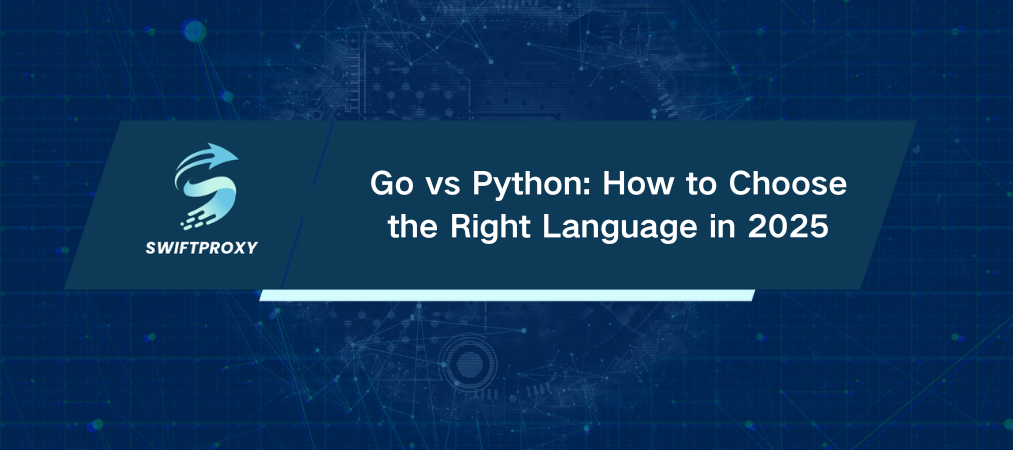Go vs Python: How to Choose the Right Language in 2025

In 2025, two languages keep stealing the spotlight: Go and Python. Both powerful. Both popular. Yet, they serve very different purposes. Whether you're building lightning-fast cloud services, crafting cutting-edge AI, or whipping up web apps, understanding their strengths is crucial. Let's cut through the noise and get straight to what matters.
Meet Go
Go (or Golang) was born at Google to tackle massive, performance-heavy systems. It's a statically typed, compiled language built for speed and simplicity.
Why Go rocks: It compiles directly into fast machine code, so apps launch and run swiftly.
Concurrency magic: Goroutines and channels are Go's secret sauce, allowing developers to handle thousands of simultaneous tasks effortlessly.
Simplicity that scales: Its clean syntax prevents code bloat and keeps massive codebases readable.
Ideal use cases: Cloud-native apps, DevOps tools, distributed systems, containerized microservices, and any environment demanding blazing speed with minimal lag.
Go's memory management is tight, with a garbage collector optimized for low latency — critical for real-time applications. Plus, its built-in module system simplifies dependency management, so you spend less time wrestling with packages.
Enter Python
Python is the language everyone loves to love. Dynamic, interpreted, and downright easy to read — it's the go-to for beginners and experts alike.
Why Python shines: Fast prototyping and iteration, thanks to its interpreted nature and minimal syntax.
Massive ecosystem: Libraries like NumPy, Pandas, TensorFlow, and Scikit-learn make it king in data science, machine learning, and automation.
Flexible and forgiving: Its dynamic typing and high-level abstractions mean fewer lines of code and faster development cycles.
Common playgrounds: Web development, scientific computing, AI/ML, scripting, and rapid prototyping.
Python's extensive libraries turn complex problems into manageable tasks. For data-heavy projects or AI research, it's still the industry favorite.
Go vs Python
Syntax and Readability
Go is strict but clear, forcing good habits that pay off at scale.
Python is concise and intuitive, making it easy to onboard new developers and prototype rapidly.
Example:
package main
import "fmt"
func main() {
fmt.Println("Hello, Go!")
}
print("Hello, Python!")
Python wins for simplicity; Go wins for disciplined maintainability.
Performance and Speed
Compiled Go applications execute at near-native speed. Python's interpreted approach means slower runtime, but lightning-fast development cycles.
If you need raw performance and efficiency? Go takes the crown. For quick iterations and flexibility? Python wins.
Concurrency and Scalability
Go's goroutines are lightweight threads managed by the runtime — they let you handle thousands of concurrent tasks smoothly and efficiently.
Python uses AsyncIO and threads but is bottlenecked by the Global Interpreter Lock (GIL), limiting true parallelism.
For scalable network services and APIs, Go is your friend. Python requires careful design to come close.
Use Case Showdown
Web Scraping
Python dominates. BeautifulSoup, Scrapy, requests — these tools make scraping fast, powerful, and developer-friendly. Plus, data processing with Pandas or NumPy is a breeze. Go can scrape, but you’ll spend more time building what Python offers out of the box.
Web Development
Both are strong contenders.
Python's Django, Flask, and FastAPI bring mature, feature-rich frameworks. FastAPI, in particular, excels at async APIs with minimal effort.
Go's Gin and Echo are minimalist, lightning-fast frameworks ideal for building performant backends with fewer dependencies.
Backend Systems and Microservices
This is Go's playground. It's built for scalable APIs and distributed systems. Its efficient memory use and concurrency model make it unbeatable in high-load environments.
Machine Learning and Data Science
Python is king here — hands down. With TensorFlow, PyTorch, and a rich ecosystem supporting visualization and analysis, Python powers most AI and data science projects today. Go is growing but far behind.
Advantages and Disadvantages at a Glance
Go delivers high performance, a simple concurrency model, and a low memory footprint. It's especially strong in cloud-native environments where speed and scalability are critical.
That said, Go has a smaller ecosystem, more verbose error handling, and a learning curve that may feel steep for beginners.
Python is easy to learn, great for rapid prototyping, and supported by a massive library ecosystem and rich community. It's a top choice for AI, machine learning, and data-heavy tasks.
The trade-offs? Python has slower runtime performance, limited concurrency due to the GIL, and tends to use more memory.
When to Choose What in 2025
If you need blazing speed, scalability, and rock-solid performance, Go is your best bet. It's built for cloud-native applications, real-time APIs, and microservices that need to scale without breaking a sweat.
On the other hand, if your focus is fast prototyping, AI, machine learning, or data-heavy workflows, Python stands out with unmatched flexibility and a rich ecosystem.
For web scraping, Python is the clear winner thanks to its mature libraries and ease of use.
When it comes to web backends, the decision depends on your team and priorities—choose Python for rapid development and feature-rich frameworks, or Go if you need raw speed and efficient resource handling.
Final Thoughts
Go and Python aren't rivals—they shine in different arenas. The right pick comes down to your needs, whether you're after high-speed performance and concurrency or simplicity and a rich ecosystem.

















































